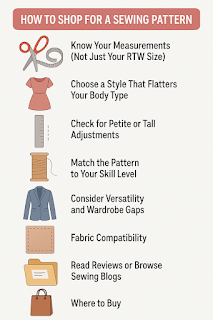 |
| Use this quick-reference checklist to shop smarter for sewing patterns that fit your body, flatter your shape, and match your sewing skill level. |
Choosing the correct sewing pattern is a blend of inspiration, knowledge, and strategy. Whether you're a beginner or a seasoned maker, your success in sewing starts with selecting a pattern that matches your body, skill level, and wardrobe goals.
In this post, I’ll walk you through everything you need to know before clicking “Add to Cart” so you can choose your next sewing project with total confidence.
✅ 1. Know Your Measurements (Not Your Store Size!)
Sewing pattern sizes differ from those found in stores. You might wear a size 10 off the rack but need a size 14 in patterns. That’s why it’s essential to understand sewing pattern sizes before making a purchase.
Take accurate body measurements:
Bust
Waist
Hips
Back waist length
Then, compare those to the size chart on the sewing pattern envelope. If you’re between sizes, many patterns show how to blend them for a better fit.
 |
| Use this measurement chart to find your sewing pattern size based on bust, waist, hip, and back waist length—essential for a proper fit. |
👗 2. Choose a Style That Flatters Your Body Type
Part of choosing the best sewing pattern is finding styles that highlight your natural shape. Here’s an essential guide:
Pear-shaped: A-line skirts or detail on top to balance your silhouette
Apple-shaped: Empire waists and wrap dresses are flattering choices
Hourglass: Look for patterns that accentuate the waist with darts or belts
Rectangle: Try adding shape with gathers, flares, or ruffles
Want to learn how to read a sewing pattern to find the right fit? Check the line drawings on the back—they reveal how the garment is constructed and where it adds volume or shaping.
📏 3. Adjust Patterns for Petite or Tall Frames
Fit isn’t just about width—it’s also about length. Some patterns are labeled “Miss Petite” or “Tall”, but even if they’re not, you can often adjust the pattern using built-in lengthen/shorten lines.
This is crucial when you're learning how to fit sewing patterns to your body.
🧵 4. Choose Patterns That Match Your Skill Level
All sewing patterns come with a skill rating:
Beginner: Simple shapes, easy fabrics, few pieces
Intermediate: Darts, zippers, sleeves, and linings
Advanced: Tailoring techniques, delicate fabrics, and more shaping
If you’re just starting out, look for the best sewing patterns for beginners—these help you build confidence without frustration.
🧥 5. Match the Pattern to Your Wardrobe & Lifestyle
Choose sewing patterns that work with your daily life. Ask yourself:
Will I wear this often?
Can I mix and match it?
Is it seasonally appropriate?
Look for wardrobe patterns or capsule wardrobe sewing patterns with multiple versions in one envelope—ideal for stretching your creativity and wardrobe.
🎨 6. Check the Recommended Fabrics
Always look at the recommended fabric list on the back of the pattern. It ensures the garment will drape and behave the way it’s designed to.
Lightweight woven fabrics for breezy garments
Knits for body-hugging styles
Structured fabrics like denim or linen for tailored pieces
Also, double-check yardage, notions, and pattern layout before shopping.
📝 7. Read Reviews and Research Before You Buy
Learning how to choose a sewing pattern becomes easier when you see what others have done with it. Use:
YouTube sew-alongs and tutorials
Instagram hashtags like #McCalls7845 or #ButterickPatterns
This helps you discover tips, fabric choices, and even common issues before you start cutting.
🛍️ 8. Where to Buy Sewing Patterns
Great sewing patterns are available from:
Craft stores like Michaels or Hobby Lobby
Indie pattern companies (Closet Core, Cashmerette, Tilly and the Buttons)
Etsy for downloadable PDFs
Bonanza, eBay, or Etsy for vintage & out-of-print patterns
🧡 Looking for doll clothes or vintage-style wardrobe patterns? Visit my Bonanza booth
🙋♀️ FAQ: Choosing a Sewing Pattern
Q: How do I determine the correct sewing pattern size to purchase?
A: Use a measurement chart and compare your bust, waist, and hips to the size guide on the envelope. Don’t rely on your store size!
Q: What are the best sewing patterns for beginners?
A: Look for patterns labeled “Beginner.” These usually have fewer pieces, stable fabrics, and simple shapes—perfect for learning.
Q: How do I fit sewing patterns to my body?
A: Use size blending for adjustments to the bust, waist, and hips. Petite or tall? Look for patterns with lengthened or shortened lines to tweak bodice or skirt lengths.
Q: How do I read a sewing pattern?
A: The back of the envelope tells you the size chart, fabric suggestions, yardage, and required notions. Inside, you’ll find layout guides, construction steps, and tips.
Learning how to shop for a sewing pattern is part of the creative process. Once you master it, you'll avoid common mistakes and sew garments that actually fit your lifestyle and body.
Do you have a favorite go-to pattern or shopping tip? Share it in the comments—I’d love to hear what works for you!





No comments:
Post a Comment
I’d love to hear your thoughts! Feel free to share your comments, questions, or sewing stories. Please keep it friendly and relevant. Happy stitching! ✂️🧵